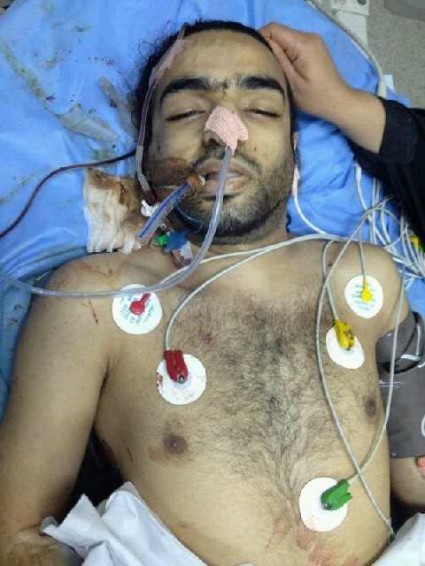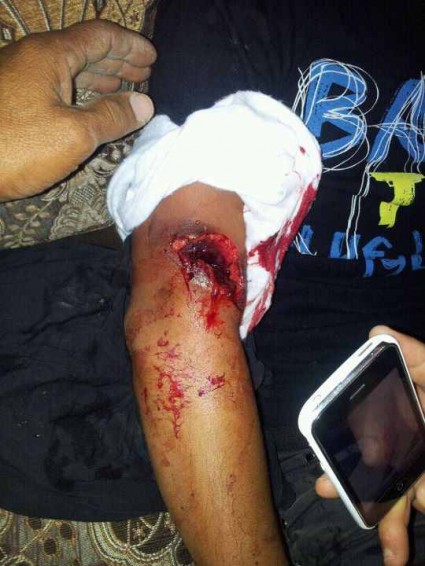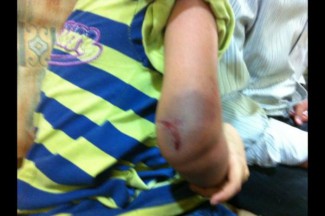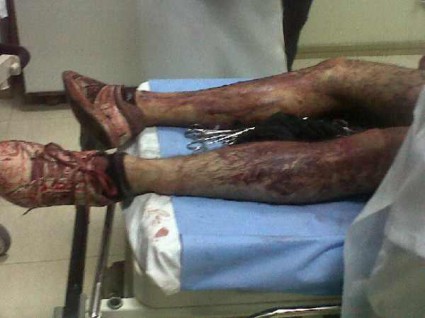Posts from — March 2012
Ahmed Ismail, Assassinated by MOI Plain Clothes Operatives while filming a Peaceful Protest, 30 March, 2012
Bahrain: Armed civilians affiliated with the security forces kill a citizen journalist
31 March 2012 – Bahrain Center for Human Rights
Bahrain Center for Human Rights condemns the continued use of excessive force against unarmed protesters and the targeting of media people who cover these protests that has resulted in a new death of a cameraman.
Citizen journalist and cameraman, Ahmed Ismael Hassan AlSamadi, (22 years old) from Salmabad, was shot in the right thigh (lower abdomen) last night at around 01:30 AM 31 March 2012, and was later announced dead. According to eye witnesses, there was peaceful protest in Salmabad which was suppressed by security forces with tear gas and rubber bullets. Armed men in a civilian car (Toyota Land Cruisers) accompanying the security forces were shooting live rounds at protesters.
Witnesses said Ahmed was filming the violations of security forces. At approximately 1:30 am he was shot with a laser-guided weapon by one of the civilian vehicles accompanying the formal security forces. He was hit in the upper right thigh (lower abdomen), as he was targeted for holding a video camera. (top right – photo of the camera with Ahmed’s blood on it). …more
March 31, 2012 No Comments
Saudi oil fields may go up in flames as King Abdullah agitates conflict with Syria
Clinton in Saudi amid oil supply concerns
30 March, 2012 – Al-Akhbar
US Secretary of State Hillary Clinton met Saudi Arabia’s king and foreign minister in Riyadh on Friday to discuss the Syria conflict against a backdrop of tension with Iran and oil policy differences.
The world’s main superpower and its top oil exporter have been strategic allies since the 1940s, but discord over how to respond to Arab popular uprisings strained relations last year.
“Both sides have recognized that their common interests are much more significant than the issues that have recently been dividing them,” said Robert Jordan, US ambassador to Saudi Arabia from 2001-03, citing anti-terrorism cooperation, concerns over a nuclear Iran, and wider Middle East stability.
Pictures broadcast on state television showed Clinton meeting King Abdullah as other officials, including Foreign Minister Prince Saud al-Faisal, Defense Minister Prince Salman, and Intelligence Minister Prince Muqrin, looked on.
Although the two states have mended the rift, differences persist on regional policy and how to tackle high oil prices.
The United States and other consumer countries fear Saudi Arabia may cut oil output if they release emergency reserves, neutralizing their effort to cool world energy markets.
Diplomats and industry sources said Western countries may want Clinton to seek reassurances that the Saudis will not undercut their bid to cut their fuel costs. …more
March 31, 2012 No Comments
Bahrain Youth Society for Human Rights, demands the immediate release of 14 prominent activists
14 prominent activists Appeal on 2 April before the Court of Cassation
30 March, 2012 – Bahrain Youth Society for Human Rights
The were arrested after protests February 14 and have been protests calling for democracy and human rights.
14 prominent activists Appeal on 2 April, 2012 before the Court of Cassation in ordinary court.
On the 22th of June 2011, Military Court judge issued a sentence on 21 defendants:
1-Abdulwahab Hussain Ali ( life sentence imprisonment)
2-Ibrahim Sharif Abdulraheem Mossa ( 5 Years imprisonment)
3-Hassan Ali Mushaima.( life sentence imprisonment)
4-Abdulhadi Al Khawaja ( life sentence imprisonment)
5-Abduljalil Abdullah Al Singace.( life sentence imprisonment)
6-Mohammed Habib Al Safaf. ( Mohammed Habib Miqdad) ( life sentence imprisonment)
7-Saeed Mirza Ahmed. ( Saeed AlNouri) ( life sentence imprisonment)
8-Abduljalil Mansoor Makk. (Abdul Jalil Miqdad) ( life sentence imprisonment)
9-Al Hurra Yousif Mohammed.( 2 Years imprisonment)
10-Abdullah Isa Al Mahroos.( 5 years imprisonment)
11-Salah Hubail Al Khawaj.( 5 years imprisonment)
12-Mohammed Hassan Jawad.( 15 years imprisonment)
13-Mohammed Ali Ismael. ( 15 years imprisonment))
14-Abdul Hadi Abdullah Mahdi Hassan ( Abdulhadi AlMukhodher) ( 15 years imprisonment)
Defendants ( in Absentia) :
15-Akeel Ahmed Al Mafoodh.( 15 years imprisonment)
16-Ali Hassan Abdullah.( Ali Abdulemam) ( 15 years imprisonment)
17-Abdulghani Ali Khanjar.( 15 years imprisonment)
18-Saeed Abdulnabi Shehab.( life sentence imprisonment)
19-Abdulraoof Al Shayeb.( 15 years imprisonment)
20-Abbas Al Omran.( 15 years imprisonment)
21-Ali Hassan Mushaima.( 15 years imprisonment)
Attached information about the Defendants – Click Here
The Bahrain Youth Society for Human Rights (BYSHR) has issued list of charges and articles (click here) used by the military prosecutor to prosecute 21 opposition leaders and human rights defenders. …more
March 31, 2012 No Comments
Dr. Kissinger on Arab Spring and Doctrine of Intervention
A new doctrine of intervention?
By Henry A. Kissinger – 30 March, 2012 – Washington Post
Henry A. Kissinger was secretary of state from 1973 to 1977
Not the least significant aspect of the Arab Spring is the redefinition of heretofore prevalent principles of foreign policy. As the United States is withdrawing from military efforts in Iraq and Afghanistan undertaken on the basis (however disputed) of American national security, it is reengaging in several other states in the region (albeit uncertainly) in the name of humanitarian intervention. Will democratic reconstruction replace national interest as the lodestar of Middle East policy? Is democratic reconstruction what the Arab Spring in fact represents?
The evolving consensus is that the United States is morally obliged to align with revolutionary movements in the Middle East as a kind of compensation for Cold War policies — invariably described as “misguided” — in which it cooperated with non-democratic governments in the region for security objectives. Then, it is alleged, supporting fragile governments in the name of international stability generated long-term instability. Even granting that some of those policies were continued beyond their utility, the Cold War structure lasted 30 years and induced decisive strategic transformations, such as Egypt’s abandonment of its alliance with the Soviet Union and the signing of the Camp David accords. The pattern now emerging, if it fails to establish an appropriate relationship to its proclaimed goals, risks being inherently unstable from inception, which could submerge the values it proclaimed.
The Arab Spring is widely presented as a regional, youth-led revolution on behalf of liberal democratic principles. Yet Libya is not ruled by such forces; it hardly continues as a state. Neither is Egypt, whose electoral majority (possibly permanent) is overwhelmingly Islamist. Nor do democrats seem to predominate in the Syrian opposition. The Arab League consensus on Syria is not shaped by countries previously distinguished by the practice or advocacy of democracy. Rather, it largely reflects the millennium-old conflict between Shiite and Sunni and an attempt to reclaim Sunni dominance from a Shiite minority. It is also precisely why so many minority groups, such as Druzes, Kurds and Christians, are uneasy about regime change in Syria.
The confluence of many disparate grievances avowing general slogans is not yet a democratic outcome. With victory comes the need to distill a democratic evolution and establish a new locus of authority. The more sweeping the destruction of the existing order, the more difficult establishment of domestic authority is likely to prove and the more likely is the resort to force or the imposition of a universal ideology. The more fragmented a society grows, the greater the temptation to foster unity by appeals to a vision of a merged nationalism and Islamism targeting Western values. …more
March 31, 2012 No Comments
MOI Police cause serious injury with “shoot to kill” tactic deployed using Chemcial Gas Canisters in “direct hits” on victims
March 31, 2012 No Comments
Salmabad Streets littered, strewn with Chemical Gas Canisters in Salamabad as protesters flee new attack
March 31, 2012 No Comments
MOI Police Chemical Gas Attack in Bilad Qadeem
March 31, 2012 No Comments
Force feeding AlKhawaja would be torture
Bahraini Hunger Striker Force Fed? If So, It’s Torture
by Richard Sollom – 31 March, 2012 – Physicians for Human RIghts
On 9 April 2011, two hours after I left his family and flew home from Bahrain, Abdulhadi Al-Khawaja, a well-known human rights activist, was brutally beaten in his home and dragged away by security forces. A military court later sentenced him to life in prison for participating in last year’s Arab Spring demonstrations.
For the past seven weeks, Abdulhadi has led a hunger strike protesting his imprisonment and torture at the hands of his captors, who this week transferred him to a military hospital. There, he is likely physically restrained to his bed. Military doctors could by now have forced a thick nasogastric tube up his nose and down the esophagus into his stomach.
Such forced feeding may sound like the best thing for Abdulhadi, who has reportedly lost 25% of his body weight due to his decision not to eat. But this painful procedure more probably caused him undue psychological trauma if it were done against his will.
Forced feeding without consent is a flagrant violation of a patient’s medical autonomy. When conducted by a physician against the patient’s will, it is medical complicity in torture, according to the World Medical Association.
This week, PHR requested that the Government of Bahrain allow an independent medical doctor to visit Abdulhadi. PHR urges that Government authorities abide by its pledge to implement the Bassiouni Report recommendations and allow such access. More importantly, the life sentence given to Abdulhadi as a prisoner of conscience should be overturned and he should immediately be released. …more
March 31, 2012 No Comments
Secretary Clinton holds “made for show meeting” with Saudi King Abdullah as he floods Syria with arms and foreign terrorists
Clinton holds talks with Saudi King Abdullah on Syria
US Secretary of State Hillary Rodham Clinton meets Saudi King Abdullah on Friday, March 30, 2012.
30 March, 20120 –
Saudi Defense Minister Salman bin Abdul Aziz, Foreign Minister Saud al-Faisal and the Kingdom’s intelligence chief, Mogran bin Abdul Aziz, were also present in the Friday meeting, which was held in the Saudi Arabian capital of Riyadh.
Clinton’s aides said the meeting focused on further sanctions against Syria and looked into ways to assist the Syrian opposition, AFP reported.
On Saturday, the US secretary of state is scheduled to attend a first ministerial meeting of the [Persian] Gulf Cooperation Council-US strategic cooperation forum, which will be held in Riyadh ahead of the second so-called “Friends of Syria” meeting due on Sunday in Istanbul, Ankara.
Ministers from Bahrain, Kuwait, Oman, Qatar and the United Arab Emirates will be present for the Saturday meeting.
Earlier this week, US State Department spokeswoman Victoria Nuland said in Washington that the Saturday meeting will discuss “missile defense cooperation with some of these (Arab) countries.”
On Wednesday, Syrian President Bashar al-Assad reiterated his government’s support for a six-point peace plan proposed by the joint United Nations and Arab League special envoy, Kofi Annan, saying Damascus will make every effort to ensure its success.
Saudi Arabia and Qatar are reportedly arming terrorist groups in Syria.
Meanwhile, an Arab League summit in Baghdad on Thursday expressed support for Annan’s plan for restoring peace in Syria, while rejecting any foreign intervention in the country and called on “a political solution and national dialogue… to preserve the unity of Syria”.
Syria has been experiencing unrest since mid-March 2011. …more
March 31, 2012 No Comments
MOI Murder and indiscriminate attacks continue on Peaceful Protesters in Bahrain
Protesters attacked in Bahrain, rights group says
By Mohammed Jamjoom – CNN – April 1, 2012
(CNN) — Government forces attacked protesters in Bahrain Saturday, according to a human rights group.
“Security forces have spent the day attacking protests in different parts of the country,” the Bahrain Center for Human Rights said in a statement. “Many serious injuries were reported, including a 15-year-old boy who was hit directly in the arm with a teargas canister.”
The group also said its president, Nabeel Rajab, was arrested before a planned march in Manama that was to be a show of solidarity with Abdulhadi Al-Khawaja, one of Bahrain’s most prominent human rights activists.
Al-Khawaja was sentenced to life in prison in June for his role in the anti-government demonstrations that swept through Bahrain a year ago. He has been on hunger strike for more than 50 days in protest of his sentence.
On Friday, Amnesty International issued a statement calling on Bahraini authorities to release al-Khawaja amid fears that he is at risk of death.
A member of al-Khawaja’s family told CNN they were informed that al-Khawaja had been taken to a hospital due to his deteriorating condition but were not allowed to visit with him.
CNN could not independently confirm the claims of attacks on protesters, but the Bahrain Interior Ministry confirmed the arrest of Rajab. The ministry said in a tweet that Rajab was arrested for “calling (for) participation in unauthorized rally & illegal gathering.”
Meanwhile, a 22-year-old protester died early Saturday after a shooting that the main Shiite opposition party Al-Wefaq blamed on neighborhood militias loyal to the Bahraini regime.
The victim, identified by police as Ahmed Ismael Abdulsamad, died of a gunshot wound to the thigh, the country’s chief of public security, Major-General Tariq Al Hassan, said in a statement released by the Interior Ministry. …more
March 31, 2012 No Comments
Criminal Chemical Gas Attack on Duraz Village
March 31, 2012 No Comments
Day 52 “freedom or death” strike by Human Rights Defender – Abdulhadi Alkhawaja Collapsed
angry arabiya @angryarabiya We arrived at Jaw for my fathers visit & were told he is not here, he has been in military hospital BDF since last night #bahrain 31-Mar
URGENT APPEAL: * Leading Bahraini human rights defender and former president and co-founder of the Bahrain Center for Human Rights Abdulhadi Alkhawaja collapsed yesterday as he continues on his 50th day of hunger strike.
Earlier in the day his blood sugar had dropped to 2.1. After collapsing, he was taken to the military hospital, then returned to prison. He then collapsed again and was taken to the prison hospital.
According to AlKhawaja’s family, his color has turned greyish, his eyes have fallen deeper into their sockets and he has lost around 25% of his weight.
It is important to note that Alkhawaja was not in good health when he started his hunger strike due to being subjected to severe torture during his detention.
The doctor informed Alkhawaja that “he might fall asleep and not wake up”, that the continuation of his hunger strike could cause him to go into a permanent coma.
March 31, 2012 No Comments
Freedom for Abdulhadi Alkhawaja Now!
March 30, 2012 No Comments
Palestinian detainee Hanaa Shalabi Wins Freedom ends hunger strike
Palestinian detainee Hanaa Shalabi ends hunger strike in deportation deal
30 March, 2012 – By AL ARABIYA
A Palestinian woman, Hanaa Shalabi, on hunger strike in protest at her detention without charges by Israel will be deported to the Gaza Strip under a deal ending her fast, the Palestinian prisoner affairs minister said on Thursday.
“Hanaa Shalabi agreed to end her hunger strike following an agreement with Israeli authorities under which she will be exiled to the Gaza Strip,” minister Issa Qaraqaa told AFP.
Shalabi, a 30-year-old from the West Bank, had stopped taking food after Israeli troops seized her in the occupied West Bank on Feb. 16. Her fast lasted for 44 days.
The Palestinian Prisoners’ Club, which tracks detainees in Israeli jails, said Shalabi had agreed to three years’ exile in Gaza, which is geographically separate from the West Bank and under Israeli blockade, “in return for ending her strike and being freed.”
“We accept Hanaa Shalabi’s choice, but deportation can in no way constitute a solution,” the Palestinian Prisoners’ Club said in a statement.”
“She had to accept because Israel put pressure on her. But we are totally opposed to all deportation measures,” the minister added.
Shalabi’s lawyer, Jawwad Boulous, said he did not know when the deal might be implemented given her deteriorating health. She had refused food for 44 days, her representatives said, though Israel’s Prisons Service put the duration at 40 days.
Confirming the agreement, Israel’s military said Shalabi would be deported to Gaza “in the next few days” and that she had promised “to avoid any involvement in terror activity.”
Should Israel deem her to have violated that undertaking it could prosecute her upon her return to the West Bank, the statement said. …more
March 30, 2012 No Comments
Maryam al-Khawaja on the protests in Bahrain
Maryam al-Khawaja on the protests in Bahrain
27 March, 2012 – The Daily Autocrat
Maryam al-Khawaja is currently the Head of Foreign Relations for the Bahrain Center for Human Rights and recently the Gulf Center for Human Rights, and a former Fulbright Scholar at Brown University. In Bahrain, al-Khawaja played an instrumental role in the democratic protests taking place in the Pearl Roundabout in February 2011, which triggered a government response of widespread arrest, discrimination, and fear to suppress dissent and quell voices for reform. She is also the daughter of Abdulhadi al-Khawaja, the founder of the Bahrain Center for Human Rights, who was among a group of high-profile activists and opposition leaders recently sentenced to life imprisonment.
As you may have noticed, things are going incredibly well in Bahrain. Over the past year, protests in the country have been met with a ruthless government response. Today, opposition groups continue to face a brutal crackdown by the ruling al-Khalifa family, which has been able to so far successfully fend off a popular revolt. The United States, our fearless democracy-promoter worldwide, has yet to take on this problem because, as your mother will tell you, it’s much easier to take on the identical problem when it is occurring in countries you don’t like (Syria) or countries where it becomes too big to ignore (Egypt) than it is to do so in countries that, let’s say, house your navy’s Fifth Fleet for instance, or act as a bulwark against regional powers you don’t like. Indeed, democracy promotion isn’t so simple in the case of important allies like Bahrain. It’s incredibly simple everywhere else though, just to be clear. Maryam sat with your correspondent to discuss the worsening situation in Bahrain and the options facing the country at this critical moment.
TDA: Thank you for taking the time to speak with us, Mayram. Of course, a lot has been happening in Bahrain of late. Let’s start by understanding how we got to where we are. In 2001, Bahrain’s ruling Sunni minority oversaw the country’s transformation to a constitutional monarchy with an elected parliament. Seems like the King was being a terrific guy. What has gone wrong?
To begin with I must point out that I find it problematic when the monarchy is referred to as the “Sunni” monarchy or when the protesters as being “Shia”. This gives a wrong indication that the problem in Bahrain is along sectarian lines, which it isn’t. People are not protesting because they are Shiaa, nor are they protesting because the monarchy is Sunni. In reality it is a classic case of oppressors vs oppressed, loyalists vs non-loyalists, with the regime pushing the sectarian card as a means of divide and conquer.
In regards to the happenings in 2001, the issue of reform was quickly put an almost complete stop when the King decided to unilaterally change the constitution. This was despite promises that he would not do so. He crowned himself King, and changed the name of the country to Kingdom of Bahrain. This new constitution instituted an elected lower house with no legislative power, and which also suffers from gerrymandering. It also instituted an upper house, completely assigned by the King.
“People are not protesting because they are Shia, nor are they protesting because the monarchy is Sunni. In reality it is a classic case of oppressors vs oppressed, loyalists vs non-loyalists, with the regime pushing the sectarian card as a means of divide and conquer.”
Basically, long story short, the new regime and constitution built an authoritarian government with the King as head of all government institutions. He issued Decree 56 which granted impunity to all government officials who committed horrific crimes of torture and killings in the 1990’s, some of whom still hold high positions today. Did the human rights situation get better for a little while? Yes, the little while it took for the regime to build up Bahrain as a financial hub, while continuing to repress dissent. Then things went back to the former situation, (there was a violent crackdown which started in August 2010, right before the spark of protests in Tunisia) which led us to where we are today. …more
March 30, 2012 No Comments
Casualities from protests today. Attacks underway on Jabalat Habshi, Sehla, Saar and Salmabad at time of this Report
March 30, 2012 No Comments
18 year old Ahmed Ismael AlSamadi, from Salmabad, shot in the stomach
His life is in danger, didn’t have the heart to take a picture of the wound in his stomach #bahrain 18 year old Ahmed Ismael AlSamadi, from Salmabad, was shot in the stomach
March 30, 2012 No Comments
Head wound victim from village protest, 30 March, 2012
March 30, 2012 No Comments
Attack on Peaceful Protest – 30 March, 2012
March 30, 2012 No Comments
Security Council statement and the changing of the picture regarding Syria
The statement of the Security Council and the changing of the picture
by Wassim Raad – 27 March, 2012 – Voltairenet.org
The Security Council statement in regard to the situation in Syria constituted a decisive turning point in international balances and at the level of the American and Western position towards the events in Syria.
For the first time since the invasion of Iraq, the United States succumbed to the principle of partnership inside the Security Council and recognized the decisive role enjoyed by Russia and China at the level of drafting the UN options. It is also the first time since that date that the Security Council adopts a statement directly featuring the Russian viewpoint.
The statement clearly toppled all the principles which for many years were perceived as being constant and could be recanted at the level of the American and Western positions towards Syria, especially the point featured in the draft resolution drawn up by Saudi Arabia, Qatar, Turkey and France with American support and was blocked by the double Chinese-Russian veto. Indeed, the statement blatantly recognized that any solution in Syria should be the object of understanding with the Syrian government and especially with President Bashar al-Assad, far away from the calls made on him to step down and the attempts to bypass the Syrian national state and it sovereign rights.
This development is not only the result of Russia’s and China’s positions but is primarily the outcome of Syria’s steadfastness in the face of the world war and the support and loyalty shown by the overwhelming majority of the Syrian people towards President Al-Assad and his reformatory program, amidst an American-Western-Turkish recognition of the Syrian army’s cohesion and the escalating collapse and divisions within the ranks of the armed gangs and the opposition political front.
The war on Syria has moved toward a new political stage with a main framework revolving around negotiations between the Syrian national state and UN Envoy Kofi Annan who is carrying conditions that can be the object of compromise but reflect an attempt by the West, its aides and agents to achieve the minimum level of gains following the defeat.
There are attempts to sustain the Gulf and Turkish escalatory positions in order to exert pressures on the negotiations between Syria and the UN envoy on the threshold of the April 1 meeting in Istanbul. In this context, numerous rumors are being spread via the international press about the possible activation of corridor projects across the Turkish border, which is a possibility that was completely thwarted by the Syrian troops – according to the American and French reports – after they gained full control over a 20-kilometer deep strip off the Turkish border, which means that any Turkish action will trigger war with Syria. …more
March 30, 2012 No Comments
Saudis funnel arms to Syria rebels
Saudis seek to funnel arms to Syria rebels
30 March, 2012 – War in Context
The Wall Street Journal reports: Saudi Arabia has pressed Jordan to open its border with Syria to allow weapons to reach rebels fighting President Bashar al-Assad’s regime, officials from both countries say, a move that could buoy Syria’s opposition and harden the conflict in the country and region.
In a March 12 meeting in Riyadh, Saudi Arabia’s King Abdullah asked his Jordanian counterpart to permit weapons shipments into Syria in exchange for economic assistance to Jordan, these officials say. Jordan hasn’t agreed, they said.
Such an agreement could escalate prospects for a broader regional conflict. Syria’s fighting has already added to the rancor between Saudi Arabia and its Gulf Arab allies, who support the country’s largely Sunni opposition, and Shiite Iran, whose government backs Mr. Assad.
The Saudi request adds to sentiment that Arab leaders have hit the wall in their efforts to resolve Syria’s impasse diplomatically. Top officials from Saudi Arabia and other Gulf Arab nations were notably absent from Thursday’s Arab League summit in Baghdad, where leaders called on Damascus to adopt a United Nations plan to stop fighting and begin political dialogue. The plan doesn’t call for Mr. Assad to step aside, as the Arab nations had sought. Mr. Assad said Thursday he would support the U.N. plan, but only once foreign countries stopped aiding rebels.
Many Middle East officials view Saudi Arabia’s arming of Afghan jihadis in the 1980s, through official and unofficial channels, as a prime contributor to the Afghan civil war and the rise of violent Islamic jihad. That has led to worries in many countries over the prospect of Saudi Arabia arming Syrian rebels now. …more
March 30, 2012 No Comments
Sweden weapons profiteering and resignation of Swedish Defense Minister Sten Tolgfors
Swedish minister quits over Saudi deal
30 March, 2012 – Hurriyet International
STOCKHOLM – Reuters – Sweden’s defense minister stepped down yesterday, citing the pressure he has faced from the country’s media over leaked plans to build a weapons plant in Saudi Arabia.
Sten Tolgfors denied any wrongdoing and insisted the plans to help Saudi Arabia build a facility for anti-tank weapons were consistent with a 2005 military agreement between the two countries. Tolgfors, defense minister in the center-right government since 2007, said he had planned to resign anyway, though at a later date.
“The media reports in recent weeks have facilitated and hastened my decision,” he told reporters in Stockholm. Tolgfors was criticized after Swedish public radio, citing leaked documents, reported that Swedish military agencies were in talks to help Saudi Arabia build a facility for repairs and modifications of anti-tank weapons.
Sweden has no ban on weapons exports to Saudi Arabia, but the reports suggested the deal was set up in a way to avoid a public discussion on the issue. Tolgfors defended the plans, saying they were in line with the military cooperation agreement signed by the two countries in 2005 and renewed in 2010. Still, calls for him to resign mounted as the left-wing opposition accused the government of trying to cover-up its involvement in the Saudi plans.
Peace activists who oppose Sweden’s military exports say it’s particularly improper for the country to strike military agreements with non-democratic regimes.
Two criminal investigations were started: One to find out whether a shell company was set up to avoid any direct links between a Swedish military agency and the Saudi regime, and another to determine whether the document leak was a breach of national security.
Prime Minister Fredrik Reinfeldt said Infrastructure Minister Catharina Elmsater-Svard would take over Tolgfors’ defense portfolio until a permanent replacement is appointed.
March 30, 2012 No Comments
Amnesty urges Bahrain to free activist on hunger strike
Amnesty International has demanded the jailed Bahraini human rights activist, Abdulhadi al-Khawaja, be released “immediately and unconditionally”.
Amnesty urges Bahrain to free activist on hunger strike
30 March, 2012 – BBC
Mr Khawaja has been on a hunger strike for the past 51 days and as his condition deteriorates there is growing concern that he may die in prison.
He is refusing food in protest at the life sentence he received in June for allegedly plotting against the state.
Amnesty described his trial by a military court as “grossly unfair”.
His conviction was based on a confession he made under duress, and no evidence was presented showing he had used or advocated violence during the mass protests against King Hamad bin Issa al-Khalifa, it said.
‘Sexual abuse and beatings’
Bahrain has been wracked by unrest since pro-democracy demonstrators occupied a prominent landmark in Manama, Pearl Roundabout, in February 2011. At least 50 people, including five police officers, have been killed, hundreds have been injured and thousands jailed.
The protesters were forcibly driven out of Pearl Roundabout by security forces in March 2011, after King Hamad declared a state of emergency and brought in troops from neighbouring states to crush dissent.
Abdulhadi al-Khawaja told the BBC before his arrest on 8 April that he had deliberately stayed away from Pearl Roundabout. …more
March 30, 2012 No Comments
Al-Khawaja “freedom or death” strike day 51
March 30, 2012 No Comments
Bahrain, King Hamad’s impunity for murder enabled by United States and United Kingdom
Bahrainis protest against use of tear gas
29 March, 2012 – Lebanon Now
Hundreds of Bahrainis staged on Thursday a sit-in outside the offices of the United Nations demanding action over the “excessive” use by police of tear gas against protesters.
Protesters gathered outside the UN house in Manama, in a rally organized by the Shia-led opposition, according to a statement by Al-Wefaq, the main opposition formation.
Police are regularly clashing with protesters who take to the streets in Shia villages despite last year’s brutal crackdown on a month-long protest that demanded democratic change in the Sunni-ruled Gulf monarchy.
Protesters, including men and women, wore medical masks and carried used tear gas canisters of the type reportedly used by police to disperse demonstrations, according to pictures provided by the opposition.
Dozens of used tear gas canisters were also piled up by the protesters outside UN offices, the pictures showed.
Protesters chanted slogans demanding the international community to “take a stance against those crimes, and dangerous violations by Bahraini authorities against unarmed” people, said the statement.
Representatives of the opposition delivered a letter addressed to UN Secretary General Ban Ki-Moon demanding action.
“This excessive use [of tear gas] is a daily flagrant violation to the UN’s Basic Principles on the Use of Force and Firearms by Law Enforcement Officials,” the letter said.
The UN High Commissioner for Human Rights last week criticized Bahraini forces for their “disproportionate use of force” as they sought to quell protests, saying their use of tear gas may have led to over 30 deaths.
“We have been receiving worrying reports of the disproportionate use of force by Bahraini security forces, including the excessive use of tear gas, the use of birdshot pellets and rubber bullets,” said spokesperson Rupert Colville.
March 30, 2012 No Comments




































